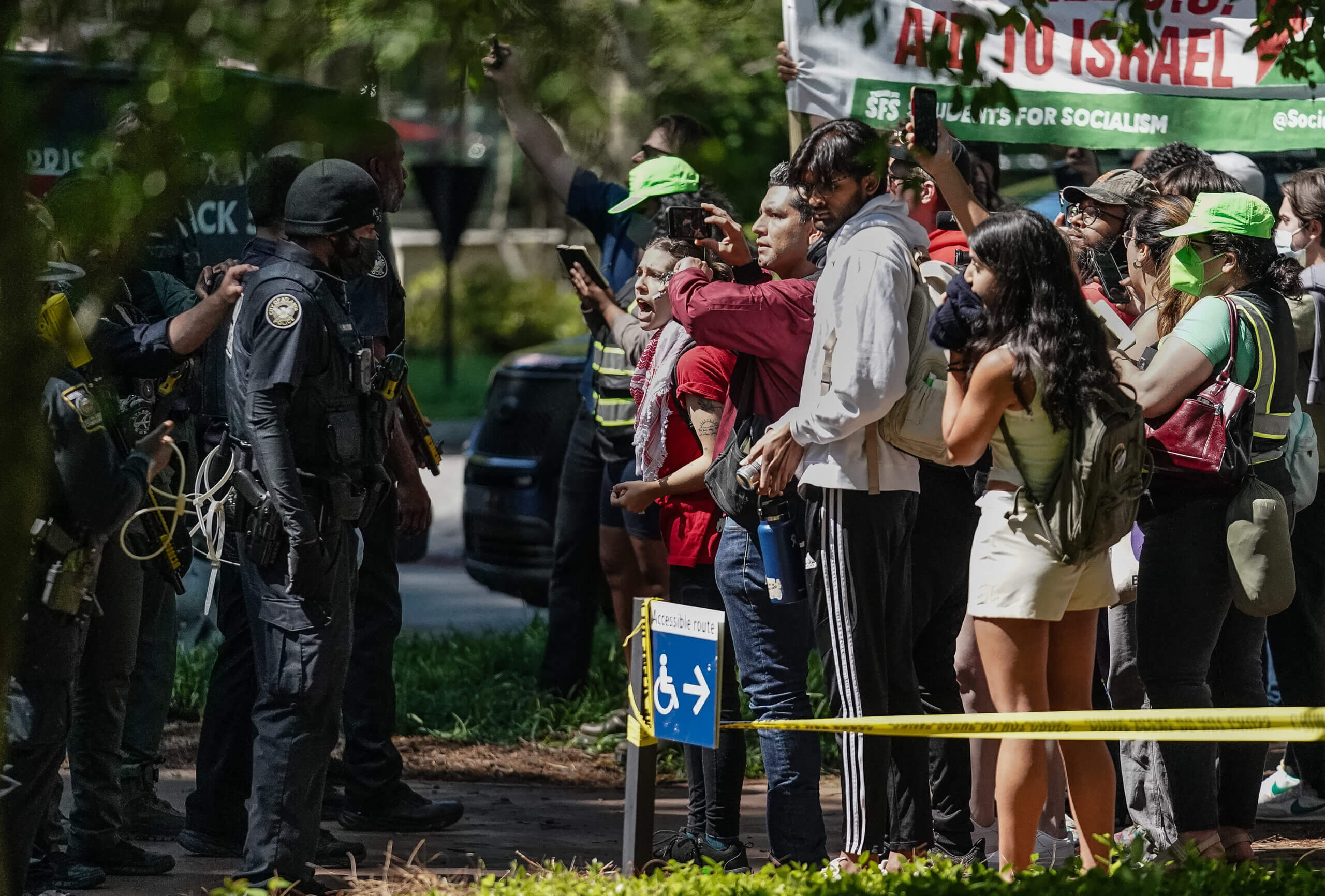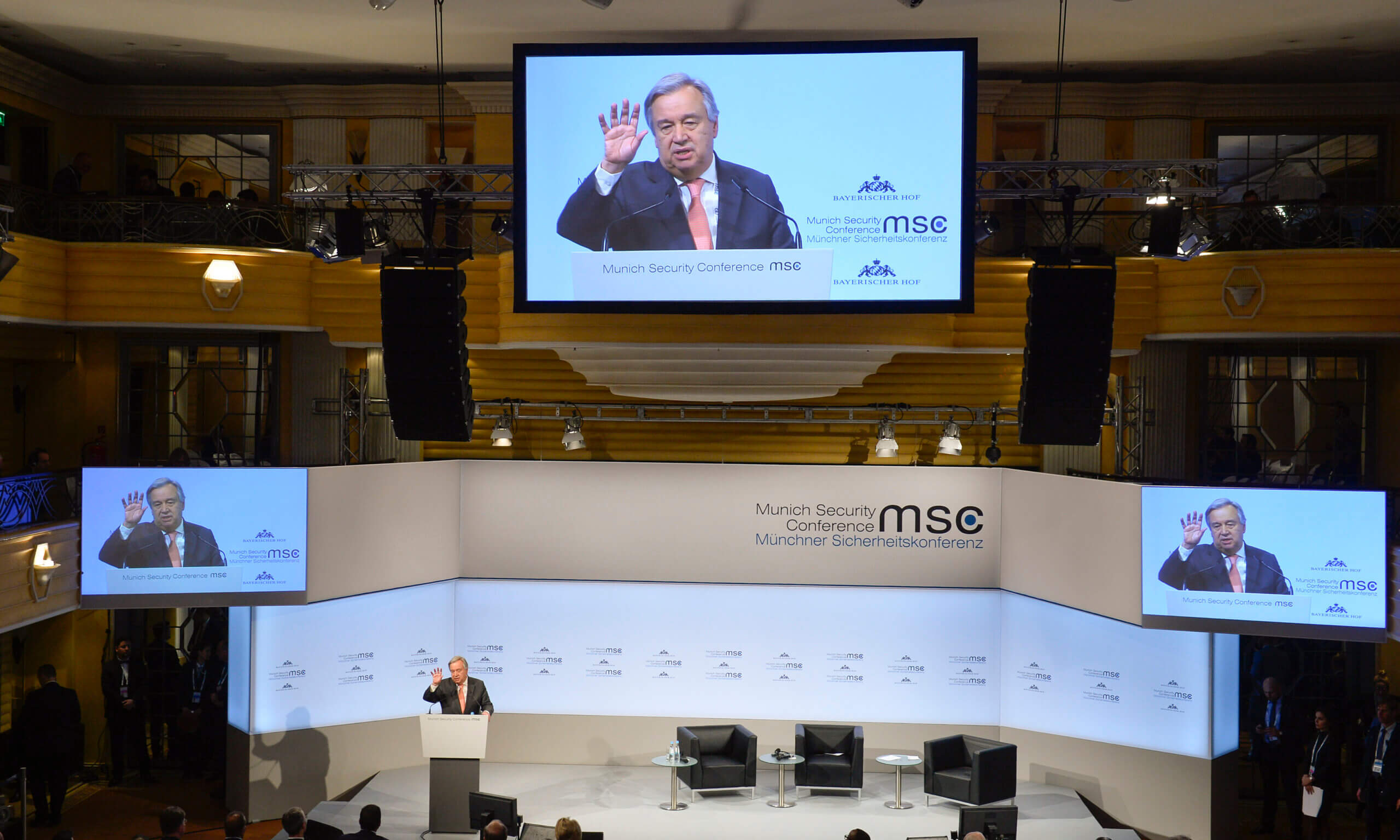Ambassador Deborah Lipstadt, the U.S. special envoy to counter antisemitism, said she expects the Trump administration to take antisemitism “very seriously.” Photo by Getty Images
Ambassador Deborah Lipstadt, the Biden administration’s special envoy for antisemitism, struck a remarkably optimistic tone Tuesday on the question of how President-elect Donald Trump’s team will approach the portfolio she has managed since 2022.
“I’m very proud of the relations I have on both sides of the aisle,” Lipstadt told a group of Jewish reporters she invited to the State Department, “which gives me some hope on this issue.”
She also praised Sen. Marco Rubio, the Florida Republican Trump has nominated for secretary of state, saying: “There’s no question he sees this and gets this 100%.”
The comments might sound surprising coming from a member of the outgoing Biden administration. Lipstadt, a renowned Holocaust scholar, was a vocal supporter of Democrats — and occasional harsh critic of Republicans — before she was tapped as envoy in 2022. But in the three years since, she has been a vocal proponent of an approach to antisemitism rooted in a defense of Israel and Zionism, something that has become anathema to many on the left since Oct. 7 and is embraced by many in Trump’s orbit.
Lipstadt on Israel, antisemitism
Lipstadt said she was proud of her work expanding the envoy’s office from one staffed by mostly political appointees who turn over with every new administration to one with around 18 career diplomats. The budget has also increased from $500,000 to around $2 million.
During her tenure, Lipstadt pushed hard for President Joe Biden to embrace the International Holocaust Remembrance Alliance’s working definition of antisemitism, which includes anti-Zionism, and placed it at the center of her signature diplomatic achievement: a set of global guidelines endorsed by three dozen countries, and praised by the Israeli government.
On Tuesday, Lipstadt referred dismissively to college students demonstrating against the war in Gaza as “pro-Palestinian, pro-Hamas, pro-whatever” and said they were a major source of the recent increase in antisemitism.
When pressed, though, on whether she really saw most student protesters as “pro-Hamas,” Lipstadt said “no.”
“I’m not denying that there were students and faculty members who truly were critical, and felt Israel’s policies were going in the wrong direction and were responsible for suffering among the Palestinians,” she explained. “But at points it became so heated, and so extreme, that you had to wonder what was happening.”

A longtime professor at Emory University who will soon be back on campus, Lipstadt said that she has been shaken to hear Jewish students, especially since Oct. 7, say they were reconsidering putting up mezuzahs on their doors or selecting schools based on the level of antisemitism.
“That’s pretty sobering,” she said. “It’s impacting people’s lives in a way it hasn’t since the 50s and 60s.”
Trump is reportedly eyeing several conservative firebrands to replace Lipstadt, including Rabbi Shmuley Boteach and former New York state lawmaker Dov Hikind, who runs Americans Against Antisemitism.
Aaron Keyak, Lipstadt’s deputy, laughed when Boteach’s name was raised during Tuesday’s roundtable, but his boss was more circumspect. “I hope it’s someone who will be a barn builder not a barn burner, who will build up as opposed to continuously shry gevalt,” using a Yiddish phrase that roughly means “make a stink.”
Lipstadt was also careful to caveat her position on the intersection between antisemitism and Israel. “As you’ve heard me say — it’s boring — ‘criticism of Israeli policies is not antisemitism,’” she told reporters at one point during the meeting.
Lipstadt hedges on U.N.
Separately, Lipstadt expressed sympathy — though not outright support — for a call to pull U.S. funding from the United Nations over concerns that it tolerates antisemitism made by Trump’s former ambassador to Israel. “If we can start to get some countries to take this issue seriously then it would be worthwhile,” Lipstadt said. The U.N.’s record on antisemitism, she added, “has not been great.”
Still, she praised U.N. Secretary-General Antonio Guterres for speaking out about the plight of Israeli hostages in Gaza. And she said that when she raised concerns to Guterres in February about Francesca Albanese, the U.N.’s controversial representative on Palestinian human rights, Gutterres was sympathetic and called Albanesea “a horrible person.”

A spokesperson for Guterres said he could not confirm the comment but noted that the secretary-general has no authority over special rapporteurs like Albanese, an Italian lawyer who has compared the war in Gaza to the Holocaust.
Albanese was criticized as antisemitic for promoting a social media post that stated: “Given that the Israel lobby has bought and paid for Congress and the two ruling parties, as well as cowed the media and universities, the rivers of blood will continue to swell. Her supporters have suggested the allegations of antisemitism are a smear campaign meant to defend Israel.
A spokesperson for Albanese did not immediately respond to inquiries Tuesday evening.
Global antisemitism remains high
The roundtable came on the same day that the Anti-Defamation League released a major global survey, its first in a decade, which found that 46% of the world’s adults harbor antisemitic attitudes.
Jonathan Greenblatt, the ADL’s CEO, said the data showed that “antisemitism is nothing short of a global emergency.”
The report showed that such attitudes had increased sharply in the Middle East and Asia. But the data also showed that in many of the countries where most diaspora Jews live — including Canada, France and Germany — antisemitic beliefs had declined significantly since the ADL’s last comprehensive survey in 2014.
For example the share of the population that agrees with a significant number of antisemitic statements, fell in France from 37% in 2014 to 13% this year; in Germany, it declined from 27% to 9%, and in Canada, from 14% to 8%.
In the United States, where Jews make up about 2% of the population, the index score remained flat at 9%.
The highest levels of antisemitism were reported in the Middle East, including some of the Gulf states — 95% of Bahrainis hold antisemitic beliefs, according to the ADL — where both the Trump and Biden administrations have spent significant energy trying to normalize relations with Israel through the Abraham Accords.
Lipstadt — whose first trip abroad as envoy was to Saudi Arabia and who traveled again to the region in December, visiting Egypt, Bahrain, the United Arab Emirates and Saudi Arabia — said she especially sought to emphasize to leaders there that “the geopolitical crisis and prejudice and hatred are two separate things.”
“We haven’t won the battle against antisemitism,” she acknowledged. “I’m too much of a historian to think that someone can solve it.”

I hope you appreciated this article. Before you go, I’d like to ask you to please support the Forward’s award-winning, nonprofit journalism so that we can be prepared for whatever news 2025 brings.
At a time when other newsrooms are closing or cutting back, the Forward has removed its paywall and invested additional resources to report on the ground from Israel and around the U.S. on the impact of the war, rising antisemitism and polarized discourse.
Readers like you make it all possible. Support our work by becoming a Forward Member and connect with our journalism and your community.
— Rachel Fishman Feddersen, Publisher and CEO
